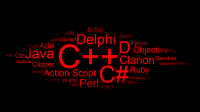Archive
POINTERS IN C LANGUAGE
What is pointer in c programming?
Pointer is a user defined data type which creates special types of variables which can hold the address of primitive data type like char, int, float, double or user defined data type like function, pointer etc. or derived data type like array, structure, union, enum.

return 0;
C PROGRAM TO CLEAR SCREEN WITH OUT USING clrscr() FUCTION
C Program To Accept Password [*appearing]
This is a simple login program in C. While accepting password it masks each character using ‘*’ symbol and display the password in the next line after the user hits Enter key. It also accepts backspaces and acts accordingly.
#include<stdio.h>
#include<conio.h>
char pw[25],ch;
int i;
void main()
{
clrscr();
puts("Enter password");
while(1)
{
if(i<0)
i=0;
ch=getch();
if(ch==13)
break; /*13 is ASCII value of ENTER*/
if(ch==8) /*ASCII value of BACKSPACE*/
{
putch('\b');
putch(NULL);
putch('\b');
-i;
continue;
}
pw[i++]=ch;
ch='*';
putch(ch);
}
pw[i]='';
printf("\n\n%s",pw);
getch();
}
C Program Without a Main Function
How to write a C program without a main function?. Is it possible to do that. Yes there can be a C program without a main function. Here’s the code of the program without a main function
HERE IS THE CODE
#include<stdio.h>
#define decode(s,t,u,m,p,e,d) m##s##u##t
#define begin decode(a,n,i,m,a,t,e)
int begin()
{
printf(” hello “);
}
__________________________________________
Does the above program run without the main function? Yes, the above program runs perfectly fine even without a main function. But how, whats the logic behind it? How can we have a C program working without main?
Here we are using preprocessor directive #define with arguments to give an impression that the program runs without main. But in reality it runs with a hidden main function.
The ‘##‘ operator is called the token pasting or token merging operator. That is we can merge two or more characters with it.
NOTE: A Preprocessor is program which processess the source code before compilation.
Look at the 2nd line of program –
#define decode(s,t,u,m,p,e,d) m##s##u##t
What is the preprocessor doing here. The macro decode(s,t,u,m,p,e,d) is being expanded as “msut” (The ## operator merges m,s,u & t into msut). The logic is when you pass (s,t,u,m,p,e,d) as argument it merges the 4th,1st,3rd & the 2nd characters(tokens).
Now look at the third line of the program –
#define begin decode(a,n,i,m,a,t,e)
Here the preprocessor replaces the macro “begin” with the expansion decode(a,n,i,m,a,t,e). According to the macro definition in the previous line the argument must be expanded so that the 4th,1st,3rd & the 2nd characters must be merged. In the argument (a,n,i,m,a,t,e) 4th,1st,3rd & the 2nd characters are ‘m’,’a’,’i’ & ‘n’.
So the third line “int begin” is replaced by “int main” by the preprocessor before the program is passed on for the compiler. That’s it…
The bottom line is there can never exist a C program without a main function. Here we are just playing a gimmick that makes us beleive the program runs without main function, but actually there exists a hidden main function in the program. Here we are using the proprocessor directive to intelligently replace the word begin” by “main”. In simple words int begin=int main.



